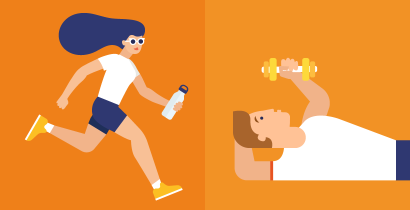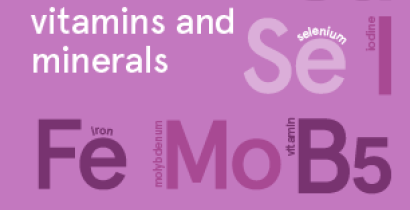Optimum nutrition for sports performance: macronutrients & micronutrients
Last Updated : 28 August 2018A well-balanced and varied diet will usually be enough to meet the nutritional needs of most physically active people.1 The tips below give advice on how to eat and drink well while being active, to help us feel energetic, perform well and recover faster.
A normal diet containing 1,800-2,400 calories per day (25-35 kcal/kg bodyweight) typically provides enough energy for exercise (where one exercise session burns 200-400 calories).2 We get our energy and nutrients mainly from the three macronutrients: carbohydrates, protein and fat. The following advice is based on the energy and nutrient requirements of adults involved in general fitness programmes (e.g., exercising 30-40 minutes per day, 3 times per week), although carbohydrate loading for athletes is briefly discussed.2 Exact needs will vary based on individual factors such as age, gender, height and activity level.
Macronutrients
Carbohydrates
Carbohydrates are an important source of energy. A normal diet, where approximately half (45-55%) of the daily calories come from carbohydrates, provides enough for most moderately active people. For example, a person weighing 70 kg needs about 210-350 g carbohydrates per day,2 preferably coming from complex carbohydrates which contain fibre including whole grains, fruits and vegetables.
The following examples each give 30 g carbohydrate:
- Bowl of oats (45 g)
- 2 slices of bread
- 4 crispbreads
- ½ serving of pasta or rice (~40 g uncooked)
- 1 large banana (~145 g)
- 3 servings (3 x 80 g) of high-carb vegetables like lentils, peas, sweetcorn, carrots
- 1 large potato (~150 g)
- Fruit smoothie (250 ml)
- (or Sports drinks (500 ml): see fluid section for more details)
Very active people, who perform high intensity exercise regularly (e.g. 2-3 hours intense exercise per day, 5-6 times per week), will need to consume extra energy and increase carbohydrate intake to 55-65% of total daily calories. This can come from carbohydrate rich foods that are low in fibre such as white bread and non-wholegrain cereal products or fruit juices and smoothies as well as sportsdrinks. The exact amount needed increases with the amount and the intensity of exercise.2
When is ‘carbohydrate loading’ useful?
‘Carbohydrate loading’ is useful for athletes taking part in events lasting more than 90 mins to maximise energy stores before their event. This involves eating 10-12 g of carbohydrate per kg body weight, per day, for 1.5-2 days before the event, while also resting from training.3 For a person weighing 70 kg, this translates to 700–840 g carbohydrate per day (contributing 2,800-3,350 kcal). Thus, the intake of carbohydrate should be doubled or tripled for one or two days before the high intensity exercise.
“Periodised carbohydrate intake” involves varying carbohydrate intake in relation to exercise sessions (e.g. training in a fasted state, eating high carbohydrate for competitions). This can improve performance in endurance sports such as 10 km races.4,5 A qualified sports nutritionist/dietitian can advise on a periodised plan to suit your needs including what types of food to eat and when.
Is eating low-carbohydrate beneficial for exercise?
There have been claims in the media that a low-carbohydrate high-fat diet (75–80% fat) can improve performance in athletes, by increasing the amount of fat that muscles burn and reducing how much they rely on carbohydrate. However, research shows eating a low-carbohydrate high-fat diet does not benefit performance.5 This is because a high fat diet decreases efficiency of the muscle during exercise.
Protein
Dietary protein is important to repair muscles after exercise and to make new muscle. Those who follow a general fitness program have the same protein needs as the general population, which is about 0.8 g of protein per 1 kg of body weight per day.2,6 If training intensely, we need extra protein (1.4-2 g/kg body weight per day, or around 100-140 g protein per day for a person weighing 70 kg).6 Be careful not to exceed the recommendations, since an excessive protein intake can have negative effects on several organs, such as the kidneys.14
The following examples each give 10 g of protein.
- 2 small eggs
- 50 g fish or chicken
- 120 g tofu
- 200 g yoghurt
- 250 ml cows’ milk / 300 ml soy milk
- 40 g cheese
- 60 g nuts or seeds
- 150 g kidney beans
Meat, fish, eggs, and milk are high quality protein sources, as they contain high levels of essential amino acids, which are needed for protein synthesis in muscles.2,7 Most research on optimal protein sources for active people has focused on milk proteins (casein and whey). Milk proteins are better digested and absorbed, and support muscle build up better than soy protein.15 Vegans can meet their daily needs by eating a variety of protein-rich plant foods such as legumes (e.g. beans, peas, chickpeas, lentils), grains, nuts and seeds.
Fat
Active people need a moderate amount of fat (about 30% of daily calories), which can easily be achieved by including oily fish (like salmon), vegetable oils or spreads, nuts, seeds and avocado in the diet.
Micronutrients and specialised products
A healthy and balanced diet, including a variety of fruits and vegetables, should provide all the micronutrients most active people need. Specialised products like meal replacement powders, protein powders, energy bars and energy gels are not recommended to the general population, as they cannot replace a healthy balanced diet and are costly. Some of these products may be recommended for active individuals involved in endurance exercise. 2 For example, carbohydrate-electrolyte solutions can enhance water absorption during exercise, hence helping with hydration while maintaing endurance performance. Active people restricting calorie intake, or following a vegetarian or vegan diet, should consult a nutritionists/dietitian about whether a low-dose multivitamin and mineral supplement may be needed in addition to a healthy diet.1 When restricting calorie intake, meal replacement powders could be effective for reducing the body weight and for weight loss maintenance, but their consumption is only advisable in people with overweight.
Before and during exercise
Carbohydrate is stored in our muscles and liver. Eating meals or snacks that contain carbohydrate 1–4 hours before we exercise helps to top up our fuel stores, giving energy to exercise for 90 minutes up to 3 hours. If you want to eat something shortly before your exercise simple carbohydrates (e.g. banana) are the best option. This is due to the quick release of energy.1
During endurance exercise (e.g. lasting longer than one hour), eating 30-60 g carbohydrates every hour can help to avoid low energy, low blood sugar levels, and a slow recovery. This helps contribute to a better performance. Suitable sources can be a sports drink, a banana, a cereal bar, or an energy gel.3
After exercise
Our body needs the right fuel to recover and to rebuild the energy stores after exercising and to build muscle.7,8 Eating within 30 minutes after exercising (about 20 g of protein with carbohydrates) is recommended. 2,9 This is especially important if your last meal was more than 3-4 hours before your workout or if you plan to exercise again within the next 8 hours.3,10
- Examples of recovery snacks
- Cheese sandwich and a handful of dried apricots
- Pasta with chicken breast
- 3 oatcakes, hummus, and a glass of milk
- A banana, cereal bar, and a bowl of fromage frais
You may also choose to eat a full meal shortly after exercise, instead of having a snack.
The effect of milk on performance has been extensively researched. Drinking milk for recovery is useful for building muscle, reducing damage exercise causes to muscles, replenishing energy stores and hydration.6,11
Fluids
Hydration is important as losing 2% or more of our body weight via water losses reduces exercise performance.12 In the 2–4 hrs before you exercise, drink 350–700 ml of fluids. During exercise, drink 400-800 ml per hour, depending on how much you sweat, and the heat and humidity.13 Sports drinks can be useful to maintain hydration levels for optimal endurance in hot and humid conditions during intense and long exercise sessions. To rehydrate after exercise, water and milk are good options.11 Large amounts of electrolytes including sodium can be lost in sweat, so if sweat losses are high, drink something containing electrolytes (such as an orange juice or a sports drink), especially when exercising for more than 2 hours.12 Alcohol consumption should be avoided, because consuming alcohol tends to have negative effects on hydration, and decreases exercise performance.16
Key messages
- Focus on getting carbohydrate, protein and fat from a variety of foods, including lots of different fruits and vegetables
- Eat a meal or snack 1 to 4 hours before exercise
- Athletes engaging in sports sessions longer than 90 minutes may benefit from carbohydrate loading in the days before the event
- For optimum recovery, eat carbohydrate and protein together within 30 minutes after exercising
- Hydrate before, during, and after exercise
- For individual advice, particularly if the diet is restrictive, seek guidance from a sports nutritionist/dietitian
References
- Potgieter S (2013). Sport nutrition: A review of the latest guidelines for exercise and sport nutrition from the American College of Sport Nutrition, the International Olympic Committee and the International Society for Sports Nutrition. South African J
- Kerksick CM, et al. (2018). ISSN exercise & sport nutrition review update: research & recommendations. Journal of the International Society of Sports Nutrition 15:38 doi: 10.1186/s12970-018-0242-y
- Burke LM, Hawley JA, Wong SH, et al. (2011). Carbohydrates for training and competition. Journal of Sports Science 29 Suppl 1:S17-27. doi: 10.1080/02640414.2011.585473.
- Marquet LA, et al. (2016). Periodization of carbohydrate intake: Short-term effect on performance. Nutrients 8(12):755 doi: 10.3390/nu8120755
- Burke LM, et al. (2017). Low carbohydrate, high fat diet impairs exercise economy and negates the performance benefit from intensified training in elite race walkers. The Journal of Physiology 595:2785–2807 doi:10.1113/JP273230.
- Jäger R, et al. (2017). International Society of Sports Nutrition Position Stand: protein and exercise. Journal of the International Society of Sports Nutrition doi: 10.1186/s12970-017-0177-8
- Phillips SM & Van Loon LJ (2011). Dietary protein for athletes: from requirements to optimum adaptation. Journal of Sports Science 29 Suppl 1:S29-38. doi:10.1080/02640414.2011.619204.
- Slater G & Philips SM (2011). Nutrition guidelines for strength sports: sprinting, weightlifting, throwing events, and bodybuilding. Journal of Sports Science 29 Suppl 1:S67-77. doi: 10.1080/02640414.2011.574722.
- Kerksick CM, et al. (2017). International society of sports nutrition position stand: nutrient timing. Journal of the International Society of Sports Nutrition 29;14-33. doi: 10.1186/s12970-017-0189-4.
- Aragon AA & Schoenfeld BJ (2013). Nutrient timing revisited: is there a post-exercise anabolic window? Journal of the International Society of Sports Nutrition 10(1):5 doi: 10.1186/1550-2783-10-5.
- Shirreffs, SM, Watson P & Maughan RJ (2007). Milk as an effective post-exercise rehydration drink. British Journal of Nutrition 98:173–180.
- Shirreffs SM & Sawka MN (2011). Fluid and electrolyte needs for training, competition, and recovery. Journal of Sports Sciences 29(S1):S39–S46.
- Sawka MN, et al. (2007). American College of Sports Medicine position stand. Exercise and fluid replacement. Medicine and Science in Sports and Exercise. 39(2):377-390.
- Ko GJ, Obi Y, Tortorici AR & Kalantar-Zadeh K (2017). Dietary protein intake and chronic kidney disease. Current Opinion in Clinical Nutrition & Metabolic Care 20(1):77-85.
- Phillips SM, Tang JE, & Moore DR (2009). The role of milk-and soy-based protein in support of muscle protein synthesis and muscle protein accretion in young and elderly persons. Journal of the American College of Nutrition 28(4):343-354.
- El-Sayed MS, Ali N & Ali ZES (2005). Interaction between alcohol and exercise. Sports Medicine 35(3):257-269.



